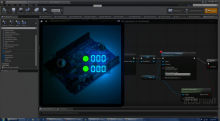I have a peripheral program (blender game engine 2.76) which I have worked on in another forum topic which successfully integrated LabJack with Blender2.76 whose python site-packages required Python3.4.3. Now I upgraded the easy commands from LabJackPython to be operable only on Python3 (not backwards compatible with Python2). However, I am need clarification on one line in u3.py. I am certain that this is only difficult since the % operator depreciated from Python2 to Python3 for byte operations. But I need to know what this line expects in as a type and what it needs to put out as a type.
Looking at the file the only lines needing change for u3.py to be fully Python3 compatible for the _DAC_ function is:::
self.dac = Dac
self.value = Value
self.cmdBytes = [ 38 + (Dac % 2), Value % 256, Value >> 8 ]
Just by switching to Python3 from Python2I was getting the error 'Type error: not all arguments converted during string formatting (u3.py) line 2379
Now I input a value (self.value).
#set DAC1 to DAC1_value after converting to hex (16bit ^4) from decimal
DAC1_value=int(round(DAC1_value/10*65535,0))
DAC1=str(hex(DAC1_value))
print(DAC1)
bytes = str.encode(DAC1)
type(bytes) # insures its bytes
print(bytes)
u3d.getFeedback(u3.DAC16(Dac=0, Value=bytes))
When I implemented the above code changing to bytes, I was getting the error' Type error: unsupported operand type(s) for %: 'bytes' and 'int'
This again is the unsupported % depreciated movement to bytes ...in Python3.4.3? In the Python3.4.3 Idle, 2%256 gives 2 and 3%2 gives 1. What I need to do is use .format and encode commands to give this function the correct input and I need to edit this one line of code in u3.py and then my program will work.
u3.py says"
d.getFeedback(u3.DAC16(Dac = 0, Value = 0x5566))
It wants this format for Value (is that a bytes type b'0x5566' or just '0x5566')
In Python3.4.3,the codecs.encode( takes a b' ' and makes it hex value but not 0x0000 format
codecs.encode(b'64', 'hex')
b'3634'
That can be done (I think)
>>> str(hex(32768))
'0x8000'
>>> str.encode('0x8000')
b'0x8000'
Any help is more than appreciated. I cannot figure out what to put in the function to get it to work in Python3.4.3...bytes....hex....string....



.png%3Fitok=PHGBxf6M)


.jpg%3Fitok=B1YcuDFK)
.png%3Fitok=Ybt-OlgU)
The value you pass for u3.DAC16 is the integer value of the binary data. So if you want to set the value to 0x5566, it would look like:
d.getFeedback(u3.DAC16(Dac = 0, Value = 0x5566)) # 0x5566 = 21862
or
d.getFeedback(u3.DAC16(Dac = 0, Value = 21862))
Don't pass a string or a bytes object.
Here's a quick example to set DAC0 to 1.5 volts:
import u3
d = u3.U3()
d.getCalibrationData()
dac0_value = d.voltageToDACBits(1.5, dacNumber = 0, is16Bits = True) # voltageToDACBits returns an int
d.getFeedback(u3.DAC16(Dac = 0, Value = dac0_value)) # Set DAC0 to 1.5 V
This is derived from the low-level quick start page's code:
https://labjack.com/support/software/examples/ud/labjackpython/low-level
Thank you very much for the help. You were exactly right. I had been passing strings <types> or <bytes>. The device now integrates with the application. Your company is terrific. We will definitely be purchasing more of your devices.